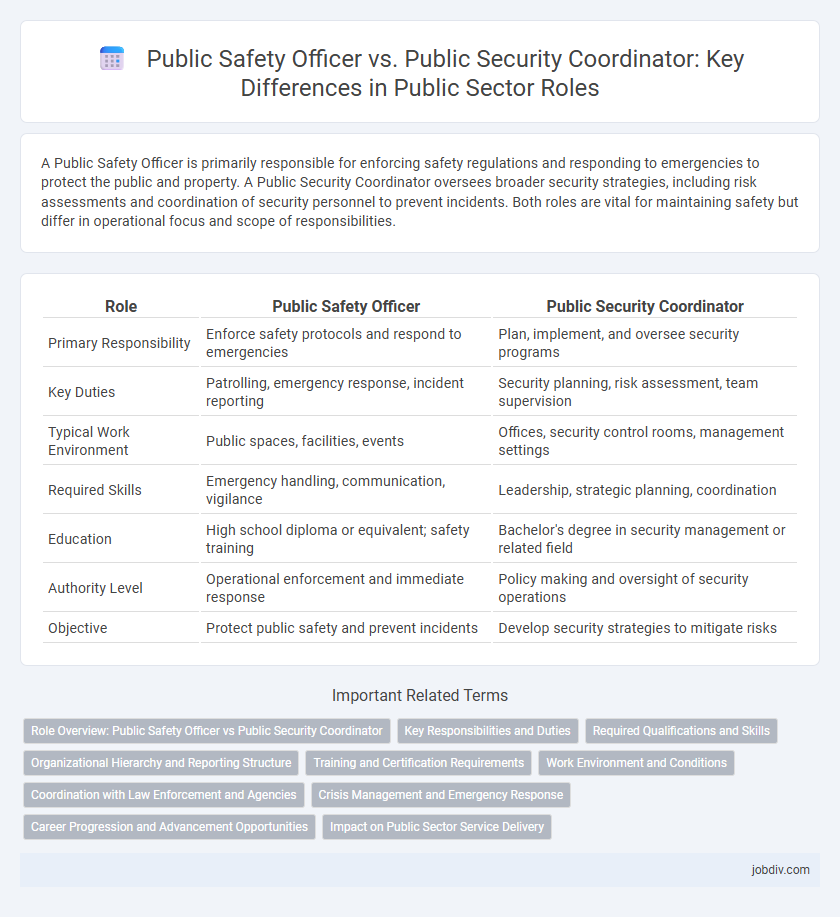A Public Safety Officer is primarily responsible for enforcing safety regulations and responding to emergencies to protect the public and property. A Public Security Coordinator oversees broader security strategies, including risk assessments and coordination of security personnel to prevent incidents. Both roles are vital for maintaining safety but differ in operational focus and scope of responsibilities.
Table of Comparison
| Role | Public Safety Officer | Public Security Coordinator |
|---|---|---|
| Primary Responsibility | Enforce safety protocols and respond to emergencies | Plan, implement, and oversee security programs |
| Key Duties | Patrolling, emergency response, incident reporting | Security planning, risk assessment, team supervision |
| Typical Work Environment | Public spaces, facilities, events | Offices, security control rooms, management settings |
| Required Skills | Emergency handling, communication, vigilance | Leadership, strategic planning, coordination |
| Education | High school diploma or equivalent; safety training | Bachelor's degree in security management or related field |
| Authority Level | Operational enforcement and immediate response | Policy making and oversight of security operations |
| Objective | Protect public safety and prevent incidents | Develop security strategies to mitigate risks |
Role Overview: Public Safety Officer vs Public Security Coordinator
Public Safety Officers primarily focus on enforcing laws, responding to emergencies, and ensuring public welfare through direct interaction and intervention. Public Security Coordinators develop and implement security policies, manage risk assessments, and oversee security teams to maintain overall safety infrastructure. Both roles are essential for comprehensive public safety but differ in operational versus strategic responsibilities.
Key Responsibilities and Duties
Public Safety Officers are responsible for enforcing laws, responding to emergencies, and conducting safety inspections to protect the public and property. Public Security Coordinators focus on developing security protocols, managing security personnel, and overseeing risk assessments to prevent threats and ensure organizational safety. Both roles emphasize maintaining a safe environment but differ in execution, with Officers on active enforcement and Coordinators on strategic planning and oversight.
Required Qualifications and Skills
Public Safety Officers typically require certifications in emergency response, CPR, and first aid, along with strong communication and situational awareness skills. Public Security Coordinators need experience in risk assessment, security protocol development, and crisis management, often supported by qualifications in security management or law enforcement. Both roles demand leadership abilities, problem-solving skills, and a thorough understanding of safety regulations and threat prevention.
Organizational Hierarchy and Reporting Structure
A Public Safety Officer typically reports to a Public Safety Manager or Director, focusing on frontline emergency response and operational tasks within the organizational hierarchy. In contrast, a Public Security Coordinator holds a mid-level managerial role, overseeing security protocols and coordinating efforts between various departments while reporting to senior security executives or administration. The Public Security Coordinator's responsibilities emphasize strategic planning and compliance, whereas the Public Safety Officer focuses on tactical execution and immediate public safety concerns.
Training and Certification Requirements
Public Safety Officers typically require basic emergency response training and certifications such as CPR, first aid, and possibly law enforcement or firefighting credentials depending on their role. Public Security Coordinators often need advanced training in risk assessment, security management, and may hold certifications such as Certified Protection Professional (CPP) or Physical Security Professional (PSP). Both roles demand ongoing professional development to stay updated on safety protocols and regulatory compliance.
Work Environment and Conditions
Public Safety Officers typically operate in dynamic environments such as government buildings, schools, and event venues, facing varying weather conditions and potential emergency situations that require quick response times and physical endurance. Public Security Coordinators generally work in office settings or control rooms, managing security operations through surveillance systems, coordinating personnel, and developing safety protocols with limited exposure to on-site physical hazards. Both roles demand vigilance, but Public Safety Officers experience more direct interaction with the public and frontline incidents, whereas Public Security Coordinators focus on strategic planning and incident support.
Coordination with Law Enforcement and Agencies
A Public Safety Officer collaborates directly with law enforcement to respond to emergencies, enforce safety protocols, and provide on-ground support during incidents. In contrast, a Public Security Coordinator focuses on strategic coordination, liaising between various agencies, organizing communication channels, and ensuring integrated security efforts. Both roles require effective collaboration with police, fire departments, and emergency services to maintain public safety and mitigate risks efficiently.
Crisis Management and Emergency Response
Public Safety Officers are primarily responsible for immediate crisis management and emergency response, including securing the scene, providing first aid, and coordinating with emergency services. Public Security Coordinators oversee broader emergency preparedness strategies, risk assessments, and implementation of security protocols to prevent and mitigate crises. Both roles require strong communication skills and quick decision-making to ensure public safety during emergencies.
Career Progression and Advancement Opportunities
Public Safety Officers typically begin their careers performing frontline duties such as patrolling, emergency response, and incident reporting, with advancement opportunities leading to supervisory roles or specialized units. Public Security Coordinators usually hold mid-level management positions focused on planning, coordinating security operations, and policy implementation, providing pathways toward senior management roles like Security Manager or Director of Security. Career progression for both roles depends on gaining relevant certifications, leadership experience, and advanced training in public safety and security management.
Impact on Public Sector Service Delivery
Public Safety Officers play a critical role in emergency response and law enforcement, directly enhancing public sector service delivery by ensuring immediate safety and crisis management. Public Security Coordinators focus on strategic planning and policy implementation, improving overall security infrastructure and preventative measures within public institutions. Both roles collaboratively strengthen public trust and operational efficiency by addressing both reactive and proactive aspects of public safety.
Public Safety Officer vs Public Security Coordinator Infographic

 jobdiv.com
jobdiv.com